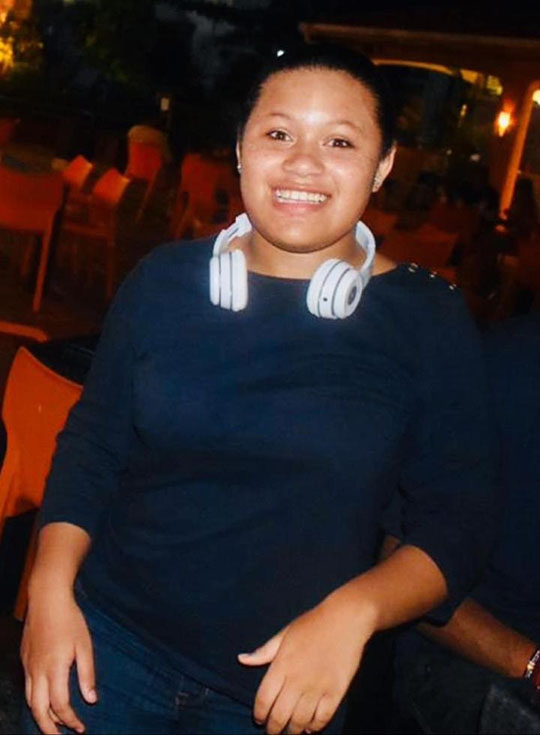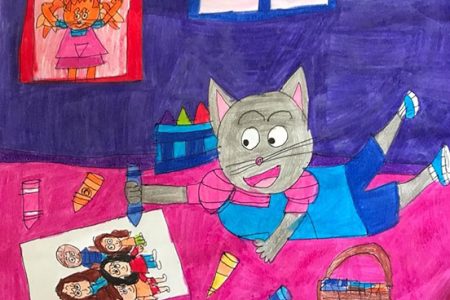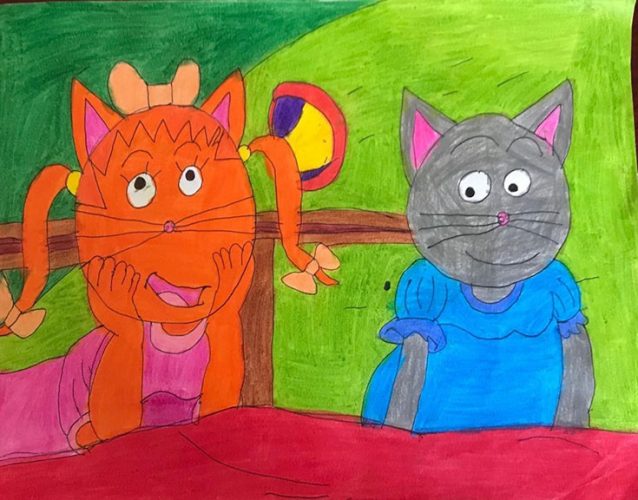Living with an autistic sister and understanding the challenges faced, was what drove Sasha Williams, a quarterfinalist in the Miss Guyana World 2020 competition, to choose autism spectrum disorder (ASD) as her Beauty with a Purpose project.
According to the Mayo Clinic, ASD is a condition related to brain development that impacts how a person perceives and socializes with others, causing problems in social interaction and communication. The disorder also includes limited and repetitive patterns of behaviour. The term “spectrum” in ASD refers to the wide range of symptoms and severity.
At a buffet lunch held at the Park Rayne Event Centre last week Sunday, Sasha launched the project titled: Spectrum, Championing Autism in Guyana; a Neurological Normal.
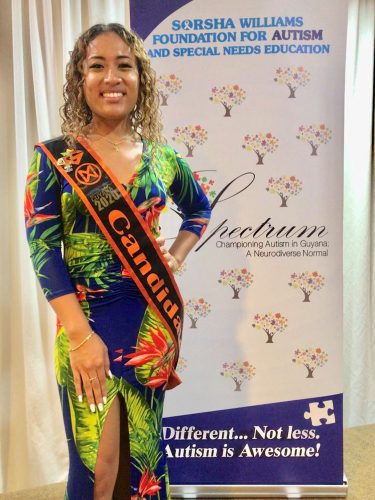
She intends to conduct outreaches in all the regions “to get the word out there and create an awareness” for detection as well as for love and support for persons with autism.
She encouraged relatives of autistic children to “accept them for who they are and to be open to new things,” saying she is a “proud autism sibling.”
Sasha chose ‘Spectrum’ as her campaign name because “no two autistic children are the same. Some children may have severe autism” while her sister’s condition is high functioning, meaning her symptoms are not severe.
The Miss Guyana World Organisation had decided that instead of having a local pageant for 2019, it will allow the contestants to conduct social programmes that will benefit society on a long-term basis.
The organisation had said in a press release that this strategy would allow the competitors ample time to “gain the confidence that is required to become the face of Guyana [and to]… build more visibility, add value, boost confidence, build character and the resilience for each journey.”
Sasha and her family have been engaged in a lot more than just awareness for autism.
In 2006, they brought autism to the fore in Guyana. It all started when they were looking for an autism school for Sasha’s younger sister, Sorsha, now 15, but they could not find any.
They then decided to establish their own organisation: the Sorsha Williams Foundation (SWF), and a special needs education facility and therapy centre to cater to her needs and those of other children with her condition.
In May, they held 10 days of intense training for 30 participants, who included speech therapists from the Ministry of Public Health, volunteers from the Ptolemy Reid Rehabilitation Centre and parents. The SWF brought in two specialists from India to conduct the training that lasted from 9 am to 3 pm each day.
The training created a safe space for participants to share experiences and learn from each other.
It also helped Sasha to open up for the first time and talk about how she was bullied and discriminated against because of her sister’s condition.
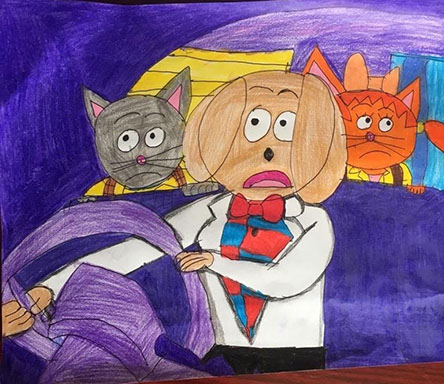
Her mother, Karen Williams told this newspaper that she was shocked to hear that and felt that she may have ignored Sasha and her youngest daughter, aged 13, while worrying about Sorsha and what the future holds for her.
Williams said too that before that, she had been pushed to pursue studies in psychology at the University of Phoenix in the US.
Looking back, Sasha said, she “didn’t like the limelight but I wouldn’t change the bullying because it made me who I am. I am strong when it comes to my sister. If anyone tells me about my sister, I am more inclined to educating them about autism.”
From their experiences, they understand the pain other parents and siblings are going through, as well as the tolerance and patience needed to cope.
Sasha and her family are passionate about providing help and support and will continue to push for the welfare of children on the spectrum. She said that the system has failed children with autism.
More government involvement
She called for more government involvement and would like to see the establishment of a state-of-the-art school for people with autism.
“As a government, they owe people the right to an education … They are trying but they are failing to realise that with mental health, you cannot put everyone in the same box as they are trying to do with the Ptolemy Reid Rehabilitation,” Sasha told Stabroek News.
“People with autism are being neglected. Parents are feeling the strain and they are neglecting their children as a result and are focusing on their neuro-typical children instead,” Sasha contended.
She said too that if her mother “was ignorant about the condition, she would be focusing on me and my younger sibling alone. Instead, she spends time ensuring that Sorsha learns and become a better person. She has the capacity to do that. Sorsha is smart like other kids with her condition and is a very good swimmer and a talented artist.”
She is also good on the computer with drawing and editing and “we want to capitalise on her talents. We are thinking about taking her up to the [United] States for someone to teach her how to do animation, photoshopping and illustration.”
At age three, they noticed Sorsha’s unusual behaviour but were not sure what was causing it.
They only picked up on her symptoms while watching an episode of the Oprah Winfrey Show that was dealing with autism.
Her diagnosis was subsequently confirmed in the US.
Williams told this newspaper that Sorsha developed normally in the beginning and had started to say a few words but then she regressed.
But with extra attention and with family members constantly repeating words to her, she started to show progress. At age seven, she started speaking fluently and they were overjoyed.
She said: “That is why the power of education and awareness and human resources are needed… It is important for the inclusion to take form.”
Sasha recalled that one of her friends once asked her what was the happiest time in her life, and her response was: “When Sorsha started talking.”
The two share the same birthday on September 11 and have a special bond.
Special education
The SWF is passionate about providing special education for autistic children, even though it is a challenge.
Williams said they are also “striving to conduct the training to make sure that teachers in every classroom [in regular schools] can pick up on just the basics of autism and really sit down with parents, talk to them and explore options for their child.”
She currently has 10 students at the school that they are working with and can get sponsorship for more children to attend.
But to qualify for sponsorship, parents have to be committed to working with their children so that they can progress, without expecting the school to provide a babysitting service.
“It is not about the number of children we have but it is about the intervention. Early intervention is a powerful intervention,” she said.
Sasha encouraged parents to seek help as soon as they notice that their child is on the spectrum.
“The longer you wait, the worse it gets and the child would not be able to restructure … Autism is not a tragedy and it should not be looked down upon. We are celebrating autism for what it is … for the strengths and weaknesses. We are focusing on autism and how we can grow as a people,” Sasha told this newspaper.
She said too that when parents bring their children to “register at the school, we tell them Sorsha was just like them and they realise that there is hope for their children.”
Confident
With regards to the pageant, Sasha said she would not have entered if she did not think that she cannot win. She is confident that she will fulfill all of the requirements of Miss Guyana World.
“I am a good role model and I can empower our women and carry my platform to its highest point. It is something that is necessary. I don’t look at it as I’m beautiful and I can do this. I want to highlight autism. We will not stop striving until autism is given the attention it deserves.”
Sasha has always been a high flyer and emerged fourth in the country at the National Grade Six Assessment in 2009.
She is currently pursuing studies in Public Relations, Advertising, and Applied Communications with a minor in Social Psychology at the Florida International University.
She is also the reigning Miss Florida International University/Caribbean Students’ Association.
Sasha is skilled in playing the steel pan and had chosen that for her talent piece for her previous pageant. She will also be playing the instrument for the Miss Guyana World pageant.
PAHO/WHO
Karen Roberts, representative of the Pan-American Health Organization/World Health Organization (PAHO/WHO), told the gathering at the launching that ASD is a “range of conditions that are characterised by some degree of impaired social behaviour.”
These may include attention deficit disorder, where the child does not spend a long time focusing on one activity.
She said the cause for ASD is not clear, based on evidence from the PAHO/WHO. But it is felt that environmental conditions and genetic factors can contribute to it.
She said PAHO/WHO is happy for the opportunity to work with SWF and other entities in tackling mental health. It will also continue to give the strategic direction to strengthen rehabilitation programmes so that children and families that are affected by autism can have the kind of care and be able to rise above the kinds of discrimination they often suffer.
